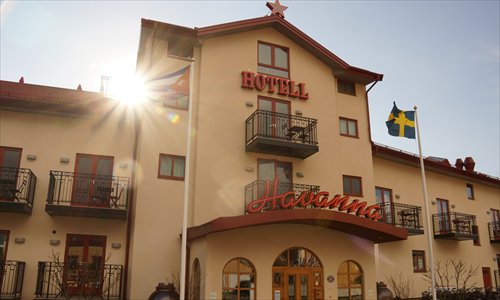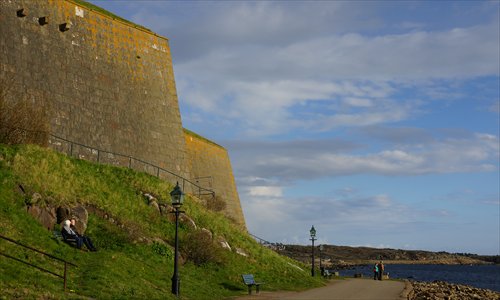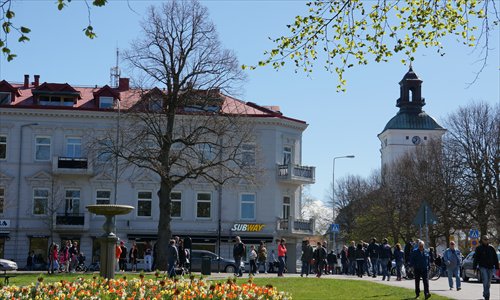HOME >> LIFE
Chinese connection
By Sindy Chan Source:Global Times Published: 2015-10-9 5:03:02
Hotels and communism bridge between Sweden and China

The Hotell Havana in Varberg, Sweden Photo: Sindy Chan

The city wall in Varberg, Sweden Photo: Sindy Chan

The Varberd Centrum Photo: Sindy Chan
I discovered a link between China and Sweden during a recent trip to Varberg in West Sweden.
It was there that I met two Swedish gentlemen who were connected to China through Maoism: Lasse Diding and Jan Myrdal.
A local teacher-turned-entrepreneur, Diding described himself as an "intellectual, communist and capitalist."
Diding was a young leftist very much into Maoism when he met Jan Myrdal, an established leftist-political writer from Bromölla, Stockholm.
Both Myrdal's parents are Nobel Prize winners. His mother Alva Myrdal received the Nobel Peace Prize in 1982 and his father Karl Gunnar Myrdal was a co-winner of the Nobel Memorial Prize in Economic Sciences.
However, it was Myrdal's personal achievements that made him "an idol" to the young Diding. Jan Myrdal and his wife, writer/photographer Gun Kessle, were among the very few foreign journalists who had the opportunity to visit China in early 1960s. Myrdal's 1963 book, Report from a Chinese Village, his three meetings with Chairman Mao Zedong and acquaintance with Mao's senior officials made him a special "comrade" to China for more than half a century.
"It was almost impossible for foreigners to visit rural areas in China in the 1960s," Myrdal said.
"I was there when the Terracotta Warriors were discovered in 1974," Myrdal recalled.
When I asked Myrdal when he last visited China, the 88-year-old tried to find a certificate to confirm the year he went to receive an honorary doctorate degree from Tianjin Nankai University. However, after a few minutes search he realizes it must have been moved elsewhere.
"The certificate was here, but I suppose volunteers needed the work space and moved it somewhere else."
Diding explained that about 100 retired librarians from all over Sweden have come to Varberg to help prepare for the opening of the "Myrdal Library."
"I was able to convince Jan to bring his personal collection of 50,000 books to Varberg," Diding said, explaining that the library will be a win-win situation for Myrdal and the city as it will preserve Myrdal's valuable books and give Varberg access to an invaluable library of information.
About 27 percent of Myrdal's books are on China. Some, such as the 1st English edition of Dr. Fung Yu-lan's A History of Chinese Philosophy from 1937, are the only such copies in Sweden.
When it comes to politics, Myrdal and Diding are both outspoken, sometimes to the point where they end up the center of controversy.
Living in a city with a 200-year tradition as a bath and spa town by the North Sea, Diding boldly brought in new elements to the city's spa culture.
The Lenin Baths in Diding's Hotell Gastis is copy of a "beautiful blue-tiled bath" at a former girls' boarding school called Smolnij in what was then Leningrad (1984). Diding explained that he created the baths so that hotel guest could experience "taking a bath just like Lenin used to."
Walking around the garden behind Diding's house, a Lenin statue with several handbags hung around its neck aroused my curiosity.
"Some radicals were unhappy with me because I let some gypsies stay in my garage for a year while my house was being restored. They put up banners on my fence, but then people began supporting me by hanging handbags on the gate."
Ever since Swedish photojournalist Hans Runesson published a photo of Danuta Danielsson swinging her handbag at a demonstrator in 1985, handbags have become a powerful symbol in Sweden.
While Myrdal spends most his time researching and writing, Diding continues focusing on his hotel business so he can have the finances to support projects like the Myrdal Library and awarding annual "Lenin Prizes" to distinguished artists and writers.
Diding opened the Hotell Havanna in Varberg two years ago. The hotel is mainly decorated with propaganda posters that he bought back from Cuba. Instead of Lenin, the bath in the Hotell Havanna is named after Ernest Hemingway, for his 20-year connection with the Cuban capital.
"The hotel represents my idea of Havana, not the real Havana," he explained.
"When Castro came to power in 1959, there were about 2,000 villas from Spanish colonial times in Cuba. Castro did not destroy the villas but just left them there. About 600 of these villas have been restored and are being used as hotels and restaurants. Hotell Havanna is very similar to a villa hotel in Havanna."
I also got a chance to see Diding's collection of Mao themed objects, such as a Christmas star decorated with a portrait of the former chairman.
I was truly amazed by Diding and Myrdal. In many respects, they know China far better than I do.
Posted in: Feature